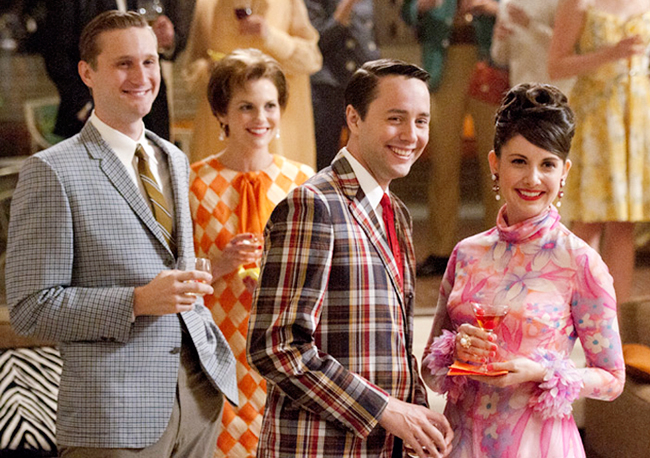Spoiler alert! The following contains spoilers from the “Mad Men” season premiere.
In the wait time between seasons of Matthew Weiner’s meticulously curated, sumptuous slow burn “Mad Men,” there has been a profusion of new period dramas. In the 17 months since we left the halls of Sterling Cooper Draper Pryce, at least four notable dramas premiered.
None of them, comparatively, measure up to “Mad Men” and its strictly high art storytelling. “The Playboy Club,” “Pan Am” (the former awful and swiftly canceled, the latter unremarkable, inoffensive and stuck in network TV renewal limbo) and to some extent “Hell on Wheels,” are too pointed, too obvious and too narrow in their use of our past as a mirror of our future.
They call too much attention to their setting. They are “period dramas;” “Mad Men” is a drama that just so happens to be set in a different time period. The distinction is syntactical, a little silly (and bracing and pretentious), but important.
“Downton Abbey” is another elaborately costumed and painstakingly set designed era drama, but its theater and drama and accents are of the stage. It moves and breathes, hits its marks and finds its light like a production at the Globe Theatre. There is an inherent artfulness to “Downton Abbey,” but its art is commanding and stirring and demands that you look at it.
No, “Mad Men” is molded from the mind of a maddening savant who creates his art as a means of self-expression, to unearth repressed pathos and for his own self-amusement; his work is not made for you to like it.
This dialectic manifests itself with particular zeal in “Mad Men’s” fifth season premiere, a two-hour saunter from frame to frame that jauntily cocks its head before asking, “We’ve been having a grand ol’ time. Where have you been?”
At first, it seems smug and showy, its acknowledgement of how its world kept living as acrimonious contract disputes between Weiner and AMC kept the show off the air for more than a year. And it’s disorienting at first, to experience the show moving up a notch from its usual slow, slow pace; it waltzes though rather gracefully.
But this sense of self-assuredness is a result of a significant decision made by its cast of characters: to change. A turning point of sorts has been reached in the show’s series-long mediation and negotiation between the characters’ desires and what is expected of them — of who they want to be and who they have to be.
Because of spoiler regulation by AMC, those changes can’t be explicitly laid out here, but in true Weiner and “Mad Men” style, they are subtle about the era’s role in motivating those changes. It avoids many period productions’ pitfall of overthinking how big, defining cultural moments affect us; they are rarely direct or specific to the individual.
Instead, “Mad Men” expresses developments in 1960 civil rights, gender roles and class in slight twinges and characters’ incomplete understandings. A mundane conversation about home carpeting trends (“Just because you see white carpet in a magazine doesn’t mean you should get it”) and labored canned bean campaigns (“We want beans to appeal to college kids — to eat during sit-ins!”) are the kind of ephemeral details that movements of change actually render themselves.
So how do we see the perpetually reticent, impatient and quixotic Don Draper change? Instead of downing another Old Fashioned, lighting another cigarette or extolling some impossibly poignant oratory? He smiles and you believe his happiness.
Printed on Friday, March 23, 2012 as: AMC's exceptional period drama rules prime time television





















